Behind a dated exterior lies a limited but sophisticated RPG with a unique setting and some unforgettable new ideas.
I think it counts a lot when an RPG comes along and is different. There are so many games that try to do what other games do, that they end up struggling to stand out, especially when they don't have the resources that larger projects do. But with Thaumaturge, developer Fool's Theory (the Polish studio that remade The Witcher 1 for CD Projekt Red, by the way) has acted smartly. It focuses on the differences and isn't afraid to leave other things out, and it means that behind Thaumaturge's admittedly dated exterior, there are some really interesting things here.
There are many things about The Thaumaturge that I admire. Let's take the setting and theme first, because it also helps explain the game. Do you know what a miracle worker is? I doubt it, neither do I. It is a term taken from our real world to refer to a person who performs miracles or wonders. Specifically, in the case of this game, a Thaumaturge is able to read people's thoughts (and influence them), see those thoughts imprinted on objects, and befriend demons. And within that description are the big ideas of the game.
The Thaumaturge is actually a detective game, because almost everything you're asked to do in the game involves going to an area and looking for clues that have emotional imprints, and finding enough to draw a conclusion about the case at hand. . Then you present this to someone, maybe there's a fight, and then you do it all over again. Generally speaking, that's the game loop. There is no looting, no commerce, none of that; in fact, there is no inventory. It's a pretty joyful experience for that reason.
 The Thaumaturge – Official Game Trailer | PC date reveal
The Thaumaturge – Official Game Trailer | PC date revealDemons are a key part of all of this. They are thematically what empowers you as a Thaumaturge, each Thaumaturge supposedly has one, a demon, and some have more than one. They fight with you, they strengthen you outside of combat, and they are what gives you an advantage. They're a bit like Pokémon, only deformed and twisted versions of them (they all come from folklore and their backgrounds make reading the game's codex fascinating). Your character, Wiktor, often talks to his demon, Upyr, not that you can understand what he says, although apparently Wiktor can. She is his lifelong friend and has been with him since he was a child.
Demons have a variety of abilities to use in combat that you can queue up along with your attacks. Combat is turn-based and revolves around a timeline idea, which I haven't seen before, not in the way it's used here. When you fight, you'll see a timeline over the battlefield showing when attacks will occur, and sorry for the sudden change in mechanics, but it also feels a bit like that in the game, when everything hits you at once.
You'll want to land your hits first, but your fastest attacks are your weakest, so the question is: what will you do? The answer is to level up and unlock more skills and more modifiers for them, which you can change at will. Maybe you want to slow enemy attacks or break them, or maybe you want to deplete their concentration gauge and open them up for devastating attacks; There are several different ideas to build on. He is good looking; Never particularly challenging, but an enjoyable thought exercise.
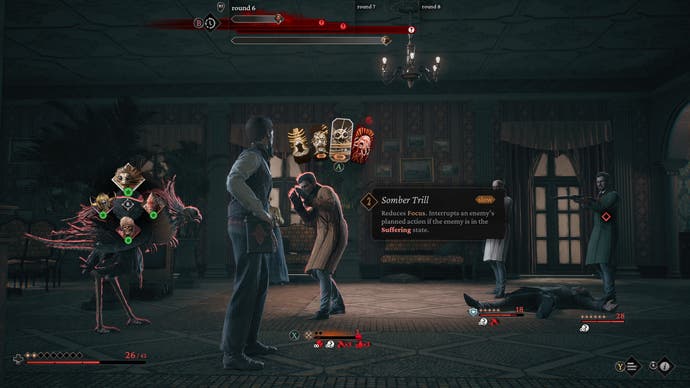
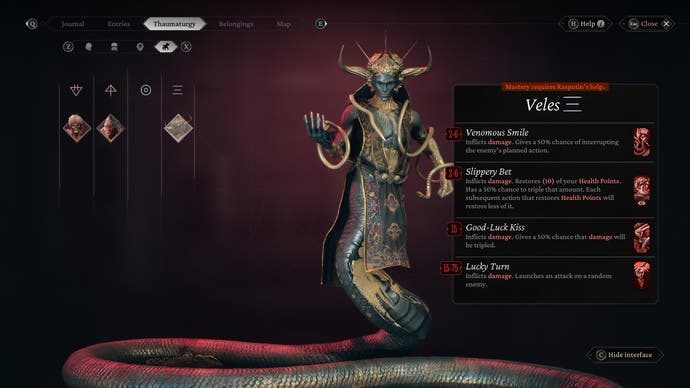
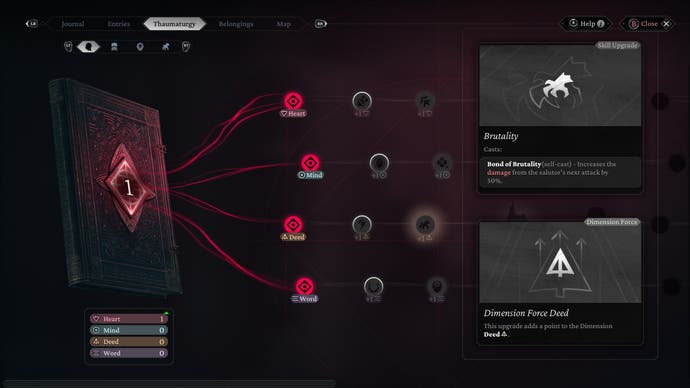
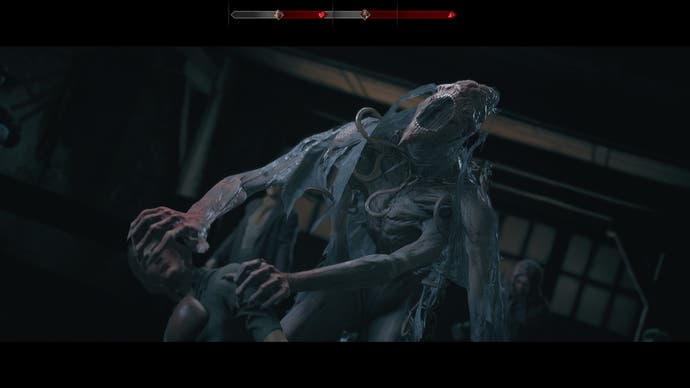
The skill tree where you unlock new abilities also has dual use outside of combat. The four skill paths (Heart, Mind, Work, and Word) determine which clues you can clear from the world around you, as long as you have a high enough score. They also allow you to use certain options in dialogue when you are in a “manipulation” moment. You will get so many points that you can usually do everything, but later in the game, some were prohibited. It was particularly annoying when it was due to a skill tree stopping my progress because I hadn't collected a certain demon, but then I ignored a lot of side quests.
So finding demons usually happens at important moments in the story, but I didn't catch them all. Thematically, discovering demons is tied to Flaws, which are personality traits like pride, which is a good idea. Once you attract one by encouraging someone's flaw, you have to fight some sort of boss battle and then you can capture it. Pride is the flaw you start with as Wiktor, and you can also use it in dialogue: the more you use it, the stronger it becomes. You can also take flaws from other characters, not that they can be used in dialogue as far as I can tell. The flaws are a good idea, but I find them inconsistent.
Detour completed; I want to return to the setting of the game because it's another particular part of The Thaumaturge that I admire. This is Poland at the beginning of the century – the other century, the 20th – and Warsaw specifically, a setting that we barely see. We don't see it in the real world either, because a lot of it was destroyed in World War II, so it's a really valuable lens into the story. It also feels authentic and personal, being made by a Polish developer, and you can feel the desire to show off this great city. At times it's like a playable history lesson, as you collect historical detritus like magazine covers and look at old photographs and artwork. There's a particularly nice sketchbook effect at points of interest where you see, for example, an artist's rendering of people eating donuts at the moment; Apparently they were very popular. The attention to detail in this regard is magnificent.
.jpg?width=690&quality=75&format=jpg&auto=webp)
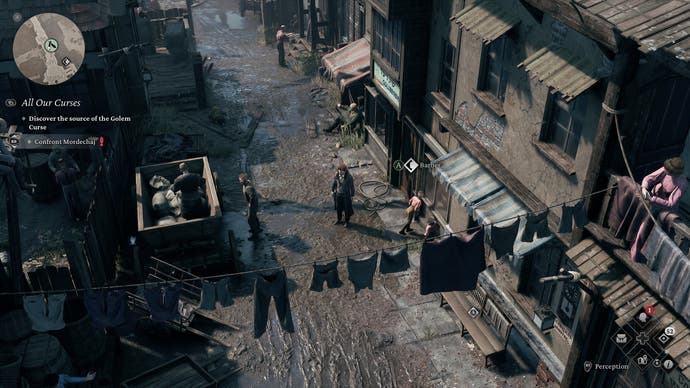
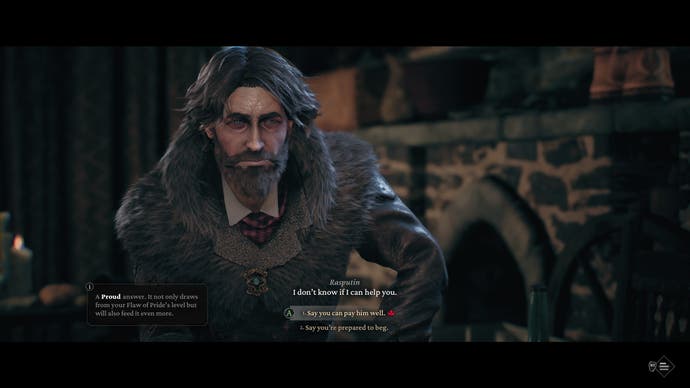
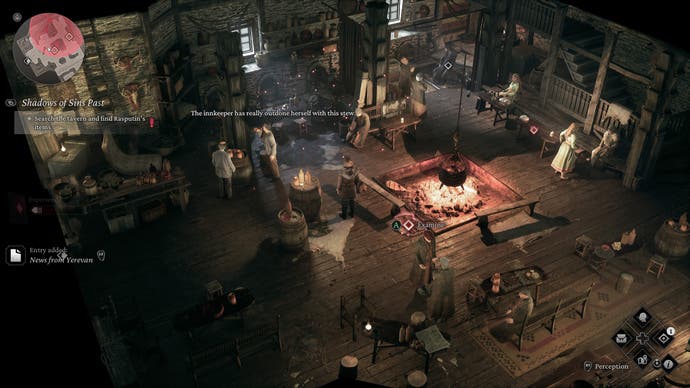
The setting also provides the politically charged backdrop of Russian-occupied Poland for the story, and some famous and notorious figures from history to play with, such as Tsar Nicholas II Romonov, the last Russian emperor, and Rasputin. Rasputin is actually a close friend of yours in the game: you are Wiktor Szulski, a wayward member of the Polish upper class, who returns home after many years after the sudden and mysterious murder of your father, with whom you had a difficult relationship. . Did it have anything to do with Thaumaturgy?
The sailing route will take you all over Warsaw and introduce you to a cast of lively characters, some of whom are stereotypically quirky, like your childhood friend Abaurycy, who is now a wannabe crime lord but is also a poet and runs a pub. – although others like your twin sister Ligia are more considerate. She, for example, longs to work at the university, but her attitude toward women of the time represses her. There is, quietly, a progressive heart to this game, and women are great examples of it.
Manage cookie settings
It speaks to a quiet kind of sophistication there is in The Thaumaturge, which may not be immediately evident, but which manifests itself gradually. It's there in the way the game explores people's thoughts, emotionally and philosophically, and asks what drives them – writing that I found endlessly interesting to read despite being asked to do so again and again. It's there in the respectful representation of Jewish culture in Warsaw, which makes its way into the main story, and it's there in the observations of the socioeconomic difficulties of the time and the care taken to portray them.
I also want to give a shout out to whoever decided that Wiktor should be a calm character and not someone who huffs and screams and screams, because his calm charm makes him a pleasure to be around. I sat through the entire credits so I could shout out Maciej Nawrocki's voice work for precisely this reason. It reminds me a lot of the Netflix series Castlevania and the way Richard Armitage voices Trevor Belmont there, and that's the biggest compliment I can think of! I wish more games took this approach. It's also lovely to see a cast full of Polish actors: local talents whose accents are not only legit but can also correctly pronounce the names and terms the script calls for. It's all refreshingly different to listen to.
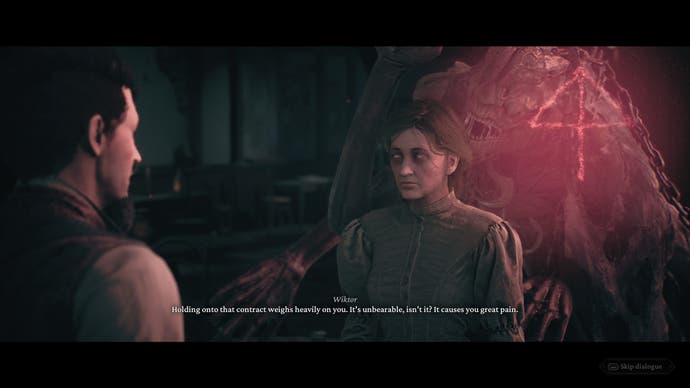
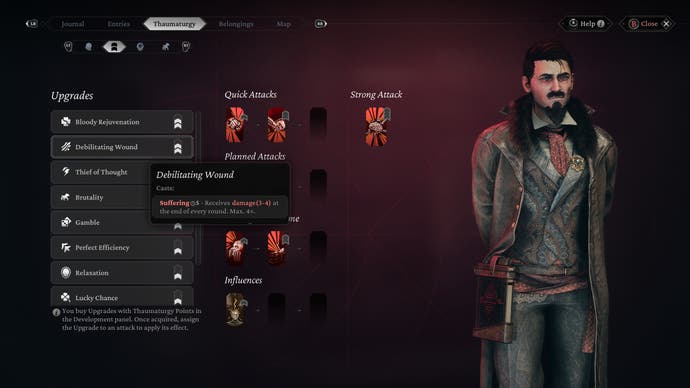
.jpg?width=690&quality=75&format=jpg&auto=webp)
Look, The Thaumaturge has obvious limitations. You don't really do much in it, other than go somewhere, look around, read, then fight (and I'm still not sure how believable it is that a mage would be an excellent physical fighter as well) and when you start branching out into secondary missions and auxiliary objectives, this is exacerbated. Traveling back and forth across Warsaw doing the same thing over and over again, no matter how much Fool's Theory tries to dress it differently, quickly becomes a chore. Worse yet, it begins to undermine the enjoyment of the game's more carefully written main quests. Which is a shame, because there are some really interesting ones, shedding light on important political attitudes of the time or opening little windows through which you can see Warsaw as it once was.
There's also no escaping the game's overall aesthetic, which is sadly dated and relies heavily on a few character models reused over and over again. That said, the city feels populated and lively, and where conversations matter, a lively attempt at a cinematic presentation has been made. It seems to be about making the best use of limited resources, but they are lacking anyway. There's a long way to go to achieve the kind of presentation that CD Projekt Red will want with The Witcher 1 remake.
Other than that, there's a lot of good stuff here. The Thaumaturge is not overbearing or demanding, and I spent a pleasant 20 hours with him. He is, gently, a persuasive little package. More importantly, I will remember it. I will remember all the ways he is unlike anything he has ever played. There's enough here to mark Fool's Theory as a study worth watching.
A copy of The Thaumaturge was provided by 11 bit Studios for review.









